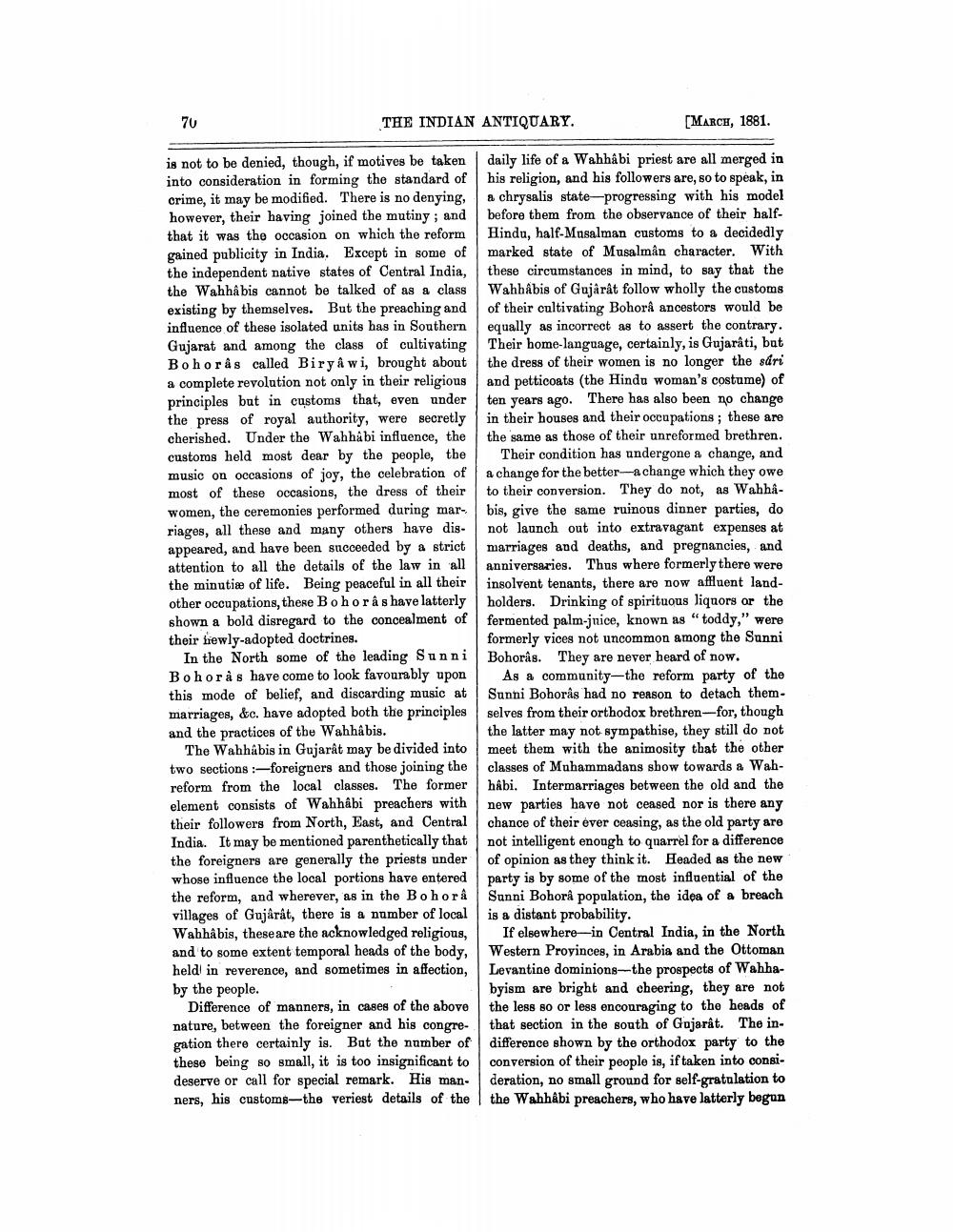________________
70
THE INDIAN ANTIQUARY.
[MARCH, 1881.
is not to be denied, though, if motives be taken daily life of a Wahhabi priest are all merged in into consideration in forming the standard of his religion, and his followers are, so to speak, in crime, it may be modified. There is no denying, a chrysalis state-progressing with his model however, their having joined the mutiny; and before them from the observance of their halfthat it was the occasion on which the reform Hindu, half-Musalman customs to a decidedly gained publicity in India. Except in some of marked state of Musalman character. With the independent native states of Central India, these circumstances in mind, to say that the the Wahhabis cannot be talked of as a class Wahhabis of Gujåråt follow wholly the customs existing by themselves. But the preaching and of their cultivating Bohorâ ancestors would be influence of these isolated units has in Southern equally as incorrect as to assert the contrary. Gujarat and among the class of cultivating Their home-language, certainly, is Gujarati, bat Bohorås called Birya wi, brought about the dress of their women is no longer the sdri a complete revolution not only in their religious and petticoats (the Hindu woman's costume) of principles but in customs that, even under ten years ago. There has also been no change the press of royal authority, were secretly in their houses and their occupations; these are cherished. Under the Wahhabi influence, the the same as those of their unreformed brethren. customs held most dear by the people, the Their condition has undergone a change, and music on occasions of joy, the celebration of a change for the better-a change which they owe most of these occasions, the dress of their to their conversion. They do not, as Wahhawomen, the ceremonies performed during mar- bis, give the same ruinous dinner parties, do riages, all these and many others have dis- not launch out into extravagant expenses at appeared, and have been succeeded by a strict marriages and deaths, and pregnancies, and attention to all the details of the law in all anniversaries. Thus where formerly there were the minutiæ of life. Being peaceful in all their insolvent tenants, there are now affluent landother occupations, there Bohorâs have latterly holders. Drinking of spirituous liquors or the shown a bold disregard to the concealment of fermented palm-juice, known as "toddy," were their liewly-adopted doctrines.
formerly vices not uncommon among the Sunni In the North some of the leading Sunni Bohorâs. They are never heard of now. Bohorås have come to look favourably upon As a community-the reform party of the this mode of belief, and discarding music at Sunni Bohorås had no reason to detach themmarriages, &c. have adopted both the principles selves from their orthodox brethren--for, though and the practices of the Wahhabis.
the latter may not sympathise, they still do not The Wahhabis in Gujarât may be divided into meet them with the animosity that the other two sections foreigners and those joining the classes of Muhammadans show towards a Wahreform from the local classes. The former hâbi. Intermarriages between the old and the element consists of Wahhabi preachers with new parties have not ceased nor is there any their followers from North, East, and Central chance of their ever ceasing, as the old party are India. It may be mentioned parenthetically that not intelligent enough to quarrel for a difference the foreigners are generally the priests under of opinion as they think it. Headed as the new whose influence the local portions have entered party is by some of the most influential of the the reform, and wherever, as in the Bohora Sunni Bohorå population, the idea of a breach villages of Gujarat, there is a number of local is a distant probability. Wahhabis, these are the acknowledged religious, If elsewhere-in Central India, in the North and to some extent temporal heads of the body, Western Provinces, in Arabia and the Ottoman held in reverence, and sometimes in affection, Levantine dominions--the prospects of Wahhaby the people.
byism are bright and cheering, they are not Difference of manners, in cases of the above the less so or less encouraging to the heads of nature, between the foreigner and his congre- that section in the south of Gojarât. The ingation there certainly is. But the number of difference shown by the orthodox party to the these being so small, it is too insignificant to conversion of their people is, if taken into consideserve or call for special remark. His man. deration, no small ground for self-gratulation to ners, his customs—the veriest details of the the Wahhabi preachers, who have latterly begun




